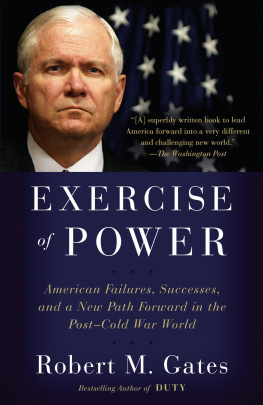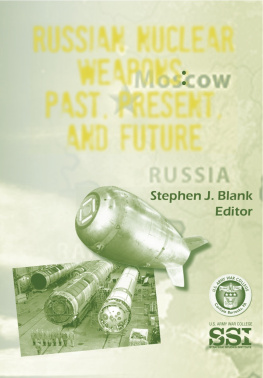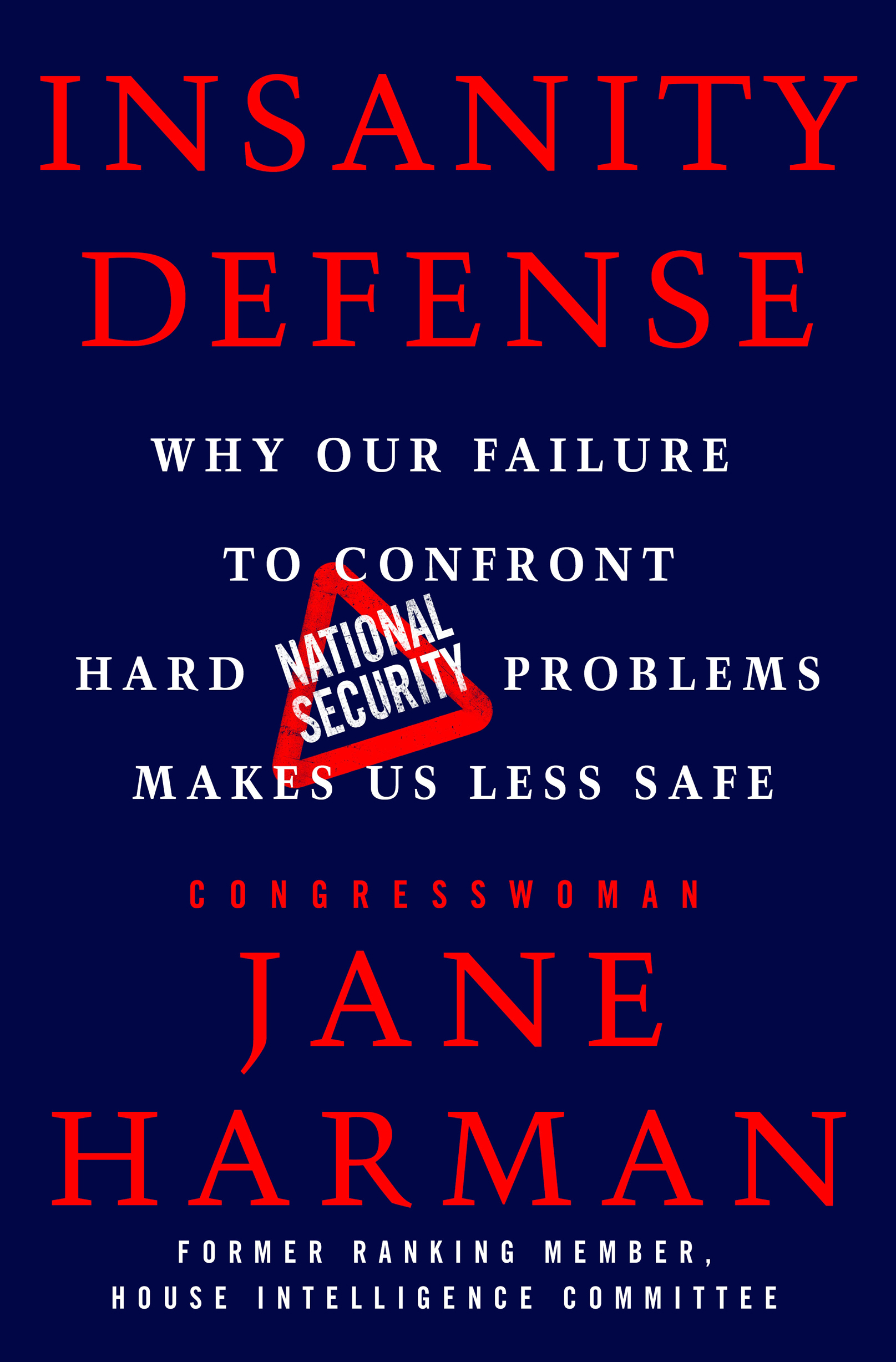The author and publisher have provided this e-book to you for your personal use only. You may not make this e-book publicly available in any way. Copyright infringement is against the law. If you believe the copy of this e-book you are reading infringes on the authors copyright, please notify the publisher at: us.macmillanusa.com/piracy.
To my perfect grandchildren: Lucy, Will, Henry, Matt, Charlie, Sadie, Nora, and Lila
The House believes the war on terror has been its own worst enemy. I was asked to argue this proposition before the Oxford Union for a debate on October 28, 2018. At first I was uncomfortable accepting the invitation. The topic was provocative. The settingthe worlds oldest and most prestigious debating societywas intimidating. But I screwed up my courage and joined the team arguing for the proposition. As I worked through my presentation and supporting arguments, I realized how central the issue is to explaining Americas mistakes in national security policy. The culprits are hubris, complacency, and an inability to comprehend a world in which others may reject our political values and economic model.
Everyone knows that the definition of insanity is doing the same thing over and over and expecting a different result. My work in the defense and intelligence space spans more than three decades, and I am vexed by the fact that policies designed to protect America are actually making us less safe. I call this insanity defense: doing the same thing again and again and expecting it to enhance our security. This book chronicles how four administrations have failed to confront some of the toughest policy issues, and it suggests achievable policy fixes that can move us toward a safer future. It is also an account by someone who was, to paraphrase the score from the musical Hamilton, in the rooms where it happened.
Consider the track record of the past thirty years:
- Slashing defense and intelligence spending at the end of the Cold War without a strategy for what the world would look like, then defaulting to military force repeatedly after 9/11 with increasingly dismal results.
- Blowing off multiple terrorism warnings and then creating a homeland security apparatus neglected and misused by successive presidents and Congresses. If 9/11 was a wake-up call, then COVID-19 is a five-alarm fire for revamping how we prepare and respond to security threats.
- Running the intelligence community on a 1947 business model, reforming it after the Iraq debacle, then undermining it through repeated purges of experienced career leadership.
- Ignoring the Constitution and the Geneva Conventions when detaining and interrogating so-called enemy combatants in the name of preventing the next attack; when faced with the ugly consequences, failing to enact a sustainable legal framework.
- Failing to use the lawful tools available to prevent post-9/11 terror attacks, then adopting a massive extrajudicial domestic surveillance program; now letting recently adopted legal provisions lapse, potentially leaving America dangerously exposed.
- Allowing successive presidents to ignore constitutional checks and balances, most egregiously after 9/11, with military operations, drone strikes, and arms sales launched without congressional approval or oversight.
- The Congress, weakened by toxic partisanship, enabling its own demise as a coequal branch of government by failing to replace the 2001 Authorization for the Use of Military Force (AUMF) and conceding other powers to the executive, all at a time when bipartisan consensus and action are needed to take on Americas hardest problems.
For most of this period I was there: as witness, legislator, exhorter, enabler, dissident, and, eventually, outside advisor and commentator. Before 9/11, I confronted the impact of defense and intelligence cuts on my aerospace-dependent congressional districtand, ultimately, on Americas national security capabilitiesin an era when domestic concerns dominated the political agenda. After 9/11, I was a leading congressional voice on intelligence and counterterrorism issues. I had the opportunity to play a role in the Bush administrations efforts to fashion a new security architecture in the years following the attacks. When bipartisan cooperation was still valued, President George W. Bush made a point of cultivating a group of us on the Democratic side. I was invited to high-level meetings and, as the ranking member of the House intelligence committee (that is, the most senior Democrat on the committee, which at the time was controlled by Republicans), received the most-classified briefings. I crafted key legislation with Republican counterparts, creating new government structures for homeland security and national intelligence. I also provided bipartisan support for some policies and approacheson detentions, surveillance, and military interventionthat I later came to regret.
After leaving the Congress, I continued to engage on these issues from my perch as president and CEO of the nonpartisan Woodrow Wilson International Center for Scholars. There I succeeded my friend and mentor Congressman Lee Hamilton, who co-chaired the 9/11 Commission from what later became my office. As an observer, analyst, and in some cases advisor, I saw the Obama administration attempt to turn the page on the war on terror while continuing with many of the same approachesif not policies and peopleas the Bush-Cheney administration: an escalating drone assassination campaign, a military surge in Afghanistan, and a policymaking approach that, in conjunction with a swollen White House staff, marginalized the administrations own cabinet departments along with the Congress. And despite the rhetoric about ending endless wars, the Trump administration followed roughly the same playbook as its predecessors: more drone strikes and Special Forces raids, continued use of the detention camp at Guantanamo Bay Naval Base, and more troop deployments and arms sales to support autocrats in the Middle East.
The political and strategic entropy is real and cannot be ignored. The reasons are varied and complex, in some cases going back generations. American leaders didnt realize soon enough that the institutions and habits formed during the Cold War were no longer effective in an increasingly multi-power world transformed by digital technology and riven by ethno-sectarian conflict. Nations that became rising centers of economic and political power, freed from the fear of the Soviets, no longer deferred to America as before. Yet we settled into a comfortable, at times arrogant, position as the lone superpower or indispensable nation. At the same time our governing institutions, which had stayed resilient, however imperfectly, through multiple crises, began their own unraveling. Our postCold War miscalculations and vulnerabilities were exposed traumatically on September 11, 2001, and have not been fundamentally addressed in the years since.
To be sure, I have some great stories to tell. But this is not a typical political memoir or retrospective. Arguably, the time for that book was soon after I left the Congress in 2011, when memories were clearer, passions were hotter, and leading personalities (and culprits) were still in office. This is a story of peopleleaders who strove to do their best under complex circumstances but were too often undermined by personal, ideological, or bureaucratic blind spots. In many respects, it is also a story of institutions: their cultures, their processes, and, too often, their inability to adapt from an industrial-age analog mindset to our digital world.











